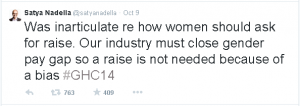
Image Credit: Microsoft
There was an immediate and overwhelmingly negative reaction to Microsoft’s CEO Satya Nadella’s comments at a recent technology conference for women where he advised that it is not so much about asking for a raise but trusting in the system to reward you for your good work. In a society where there is a scarcity of women in top leadership high tech jobs and where there are lingering and disturbing pay inequities, these comments hit some raw nerves. Here is what Nadella said:
“It’s not really about asking for the raise, but knowing and having faith that the system will actually give you the right raises as you go along. That, I think, might be one of the additional superpowers that, quite frankly, women who don’t ask for a raise have. Because that’s good karma. It’ll come back because somebody’s going to know that’s the kind of person that I want to trust. That’s the kind of person that I want to really give more responsibility to. And in the long-term efficiency, things catch up.”
Nadella swiftly recanted within social media, with an apology, “I was inarticulate re how women should ask for raise,” he tweeted several hours after his remarks. “Our industry must close gender pay gap so a raise is not needed because of a bias.”

I am going to be controversial and ask us to consider a different interpretation of Nadella’s remarks. I am going to ask us to consider that he never meant that women should not ask for a raise but rather, perhaps because of his Indian heritage and Hindu religion, his perspective on how life works in general is very different from a Western orientation. Nadella was educated in India for his primary schooling and his bachelor’s degree. He came to the United States for his Masters degree.
I am certainly no expert on Indian culture or Hinduism but I would like to posit that if one believes in Karma, that each individual creates his own destiny by his thoughts, words and deeds and to the related principle of causality where intent and actions of an individual influence the future of that individual… good intent and good deeds contribute to good karma and future happiness, while bad intent and bad deeds contribute to bad karma and future suffering then his comments might make more sense. If you understand that Indian culture comes much more from the perspective that external forces are more in control of one’s future than the individual, you can perhaps see his comments from a broader cultural understanding. According to research by interculturalist Fons Trompenaars in his book Riding the Waves of Culture, 82 percent of US Americans believe they are the “captains of their fate” and only 63 percent of Indians believe that to be true. Perhaps Nadella was saying if you have this spiritual belief that no one, men or women should have to ask for a raise.
That said, I believe that Nadella did the right thing by making it clear that he is an advocate of equality for women. When I shared this post with a couple of reviewers, one said that we have to hold leaders to a higher standard and he should have known better. I agree that leaders should be held to a higher standard but I think we should each hold ourselves to a higher standard of learning to suspend quick judgment. I think we have to start to not just interpret these kinds of statements from our own cultural lens, but rather from the lens of the other as well. If we did that maybe our response would not be anger and outrage. Maybe the response would be…Let’s really try to understand what he meant. Could there be another interpretation based on a different cultural lens? Maybe if we were not so quick to judge, we would make more progress in coming to inclusion solutions.


















